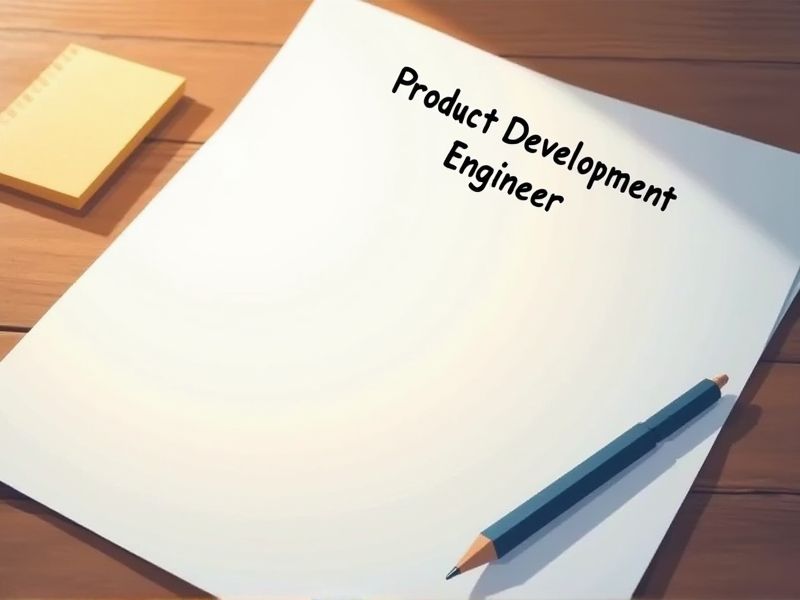
Product Development Engineers play a critical role in transforming ideas into tangible products, necessitating a deep understanding of both technical and management skills. Certifications provide formal recognition of expertise and proficiency, ensuring that engineers are equipped with the latest tools and methodologies. In the competitive landscape of product development, certifications can distinguish engineers from their peers, enhancing career growth and opportunities. Here are some key certifications beneficial for a Product Development Engineer.
Certified Product Manager (CPM)
The presence of a Certified Product Manager (CPM) is crucial because they bridge the gap between market demands and engineering capabilities, ensuring product relevance. CPMs provide strategic direction, aligning product development with business objectives, which can lead to higher profitability. Their expertise in market analysis aids Product Development Engineers in understanding customer needs, reducing the risk of product misalignment. Effective collaboration with a CPM often results in streamlined development processes and timely product launches.
Certified Product Development Professional (CPDP)
The Certified Product Development Professional (CPDP) credential validates a product development engineer's expertise in key areas like innovation, design, and cross-functional collaboration, enhancing their professional credibility. Obtaining CPDP can lead to more advanced career opportunities and higher earning potential due to the recognized standard of competence it represents. Employers often prioritize candidates with CPDP certification because it assures them of the individual's ability to effectively manage complex projects and drive product success. Continuous learning through CPDP helps engineers stay updated with the latest industry trends and methodologies, crucial for maintaining competitiveness in the dynamic field of product development.
Project Management Professional (PMP)
A Project Management Professional (PMP) certification enhances the ability of a Product Development Engineer to manage projects effectively, leading to improved project timelines and deliverables. It provides structured methodologies that help mitigate risks and manage resources efficiently, crucial in the development phase. Knowledge gained from PMP helps engineers in aligning product outcomes with business objectives, ensuring market competitiveness. By acquiring advanced project management skills, engineers contribute to cross-functional collaboration, improving communication across teams and stakeholders.
Lean Six Sigma Green Belt Certification
Product development engineers benefit from Lean Six Sigma Green Belt Certification because it equips them with tools to enhance process efficiency and product quality. The certification fosters data-driven decision-making, reducing defects and variations in design. By understanding waste elimination principles, engineers can streamline development timelines and reduce costs. Lean Six Sigma training enhances collaborative efforts, enabling better cross-functional teamwork in product innovation.
Lean Six Sigma Black Belt Certification
Lean Six Sigma Black Belt Certification equips Product Development Engineers with tools to reduce process inefficiencies, enhancing product quality and speed of delivery. This certification provides a structured approach to problem-solving, which is critical in identifying and eliminating waste in product development. Engineers with this expertise drive better alignment between customer needs and product specifications, improving customer satisfaction. Having a Black Belt Certification can also lead to leadership roles within the organization, as it demonstrates advanced proficiency in continuous improvement methodologies.
Certified Quality Engineer (CQE)
Certified Quality Engineers help identify areas for process improvement, leading to enhanced product performance and reliability. Their expertise in statistical analysis translates to a reduction in defects and production costs. Knowledge in quality management systems ensures compliance with industry standards, preventing costly legal issues. Understanding of risk management techniques allows for proactive identification and mitigation of potential product failures.
Certified ScrumMaster (CSM)
A Certified ScrumMaster (CSM) equips Product Development Engineers with the skills to facilitate agile practices, enhancing team collaboration and efficiency. Knowledge gained from the certification helps in effectively managing project timelines and adapting to changes swiftly, reducing project delays. Understanding Scrum principles fosters improved communication between engineers and stakeholders, leading to better alignment on project goals. Certified engineers often drive more satisfied and engaged teams, resulting in higher quality product outputs and innovation.
PMI Agile Certified Practitioner (PMI-ACP)
A PMI Agile Certified Practitioner (PMI-ACP) equips Product Development Engineers with a strong understanding of agile methodologies, enhancing their ability to manage and adapt to the evolving project requirements efficiently. The certification leads to improved team collaboration and communication, essential for the iterative processes inherent in product development. Employers often seek candidates with PMI-ACP certification due to the reduced project risk and increased productivity experienced when agile practices are employed. The skills learned through PMI-ACP also contribute to a quicker response to market changes, enabling engineers to deliver customer-driven products more effectively.
Professional Engineering (PE) License
The PE license establishes credibility and trust, signaling to employers and clients that the engineer adheres to industry standards and ethical practices. It allows engineers to legally sign and seal engineering documents, ensuring accountability and compliance with regulatory requirements. In many jurisdictions, the PE license is mandatory for engineers who wish to consult, bid on government contracts, or offer services directly to the public. Obtaining a PE license can lead to career advancement opportunities, potentially opening doors to leadership positions and increased earning potential.
ISO 9001 Lead Auditor Certification
Achieving ISO 9001 Lead Auditor Certification empowers a Product Development Engineer with comprehensive knowledge of quality management systems, enhancing their ability to design processes that meet international standards. By understanding these standards, engineers can identify and mitigate risks, leading to more reliable product outcomes. The certification also facilitates effective internal audits within the organization, promoting continuous improvement in product development. It encourages a culture of quality and compliance, which is essential for maintaining competitive advantage in the global market.
Summary
You enhance your technical expertise and credibility by obtaining certifications as a Product Development Engineer. This often leads to improved job performance and the ability to tackle complex projects. As a result, career advancement opportunities increase, and you might command higher salaries. Employers often view certified engineers as valuable assets, giving you a competitive edge in the job market.
